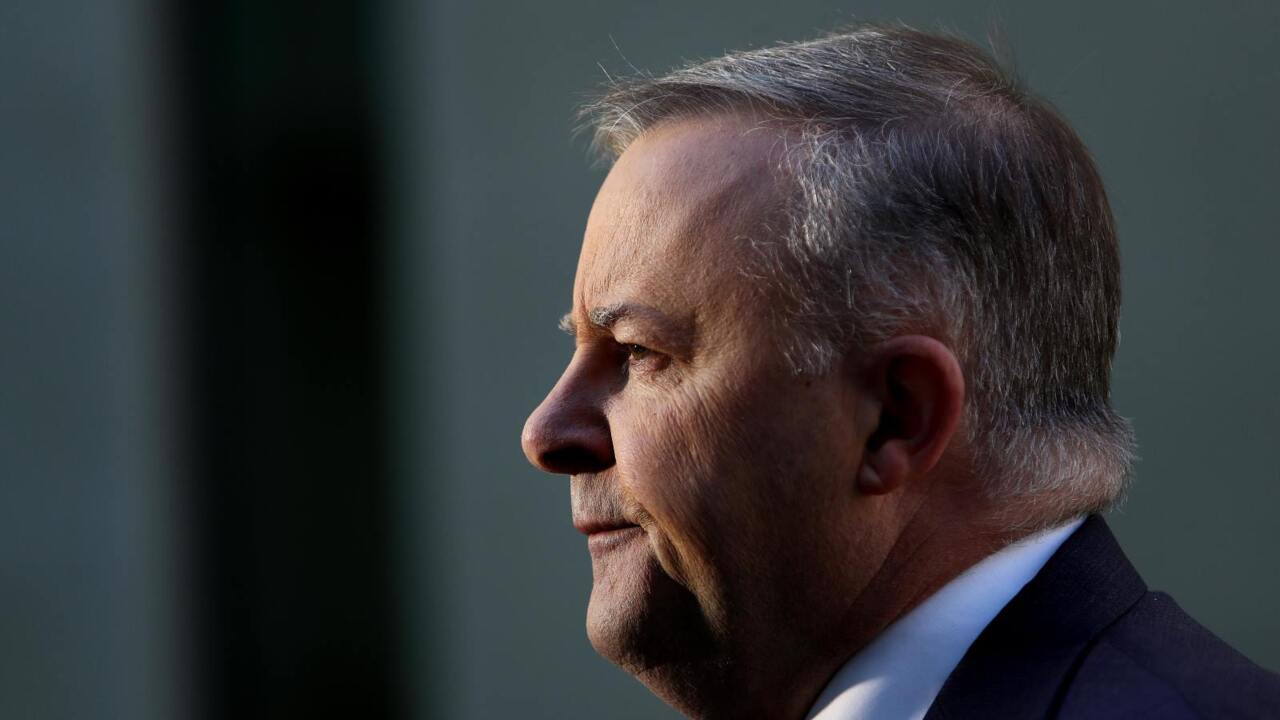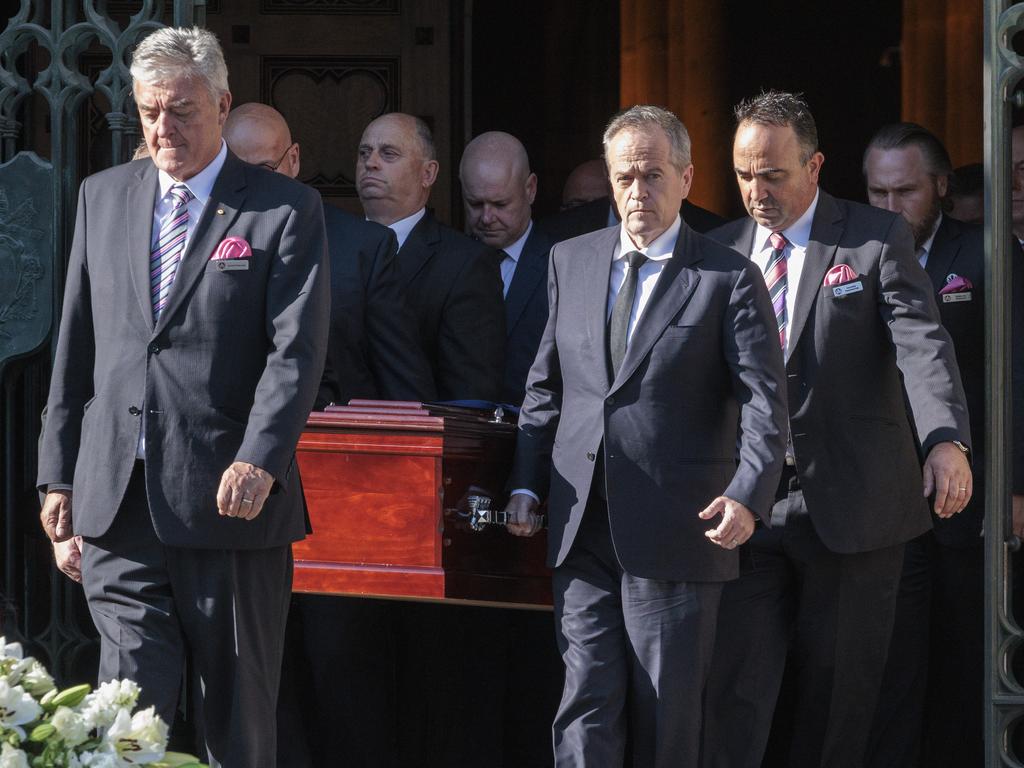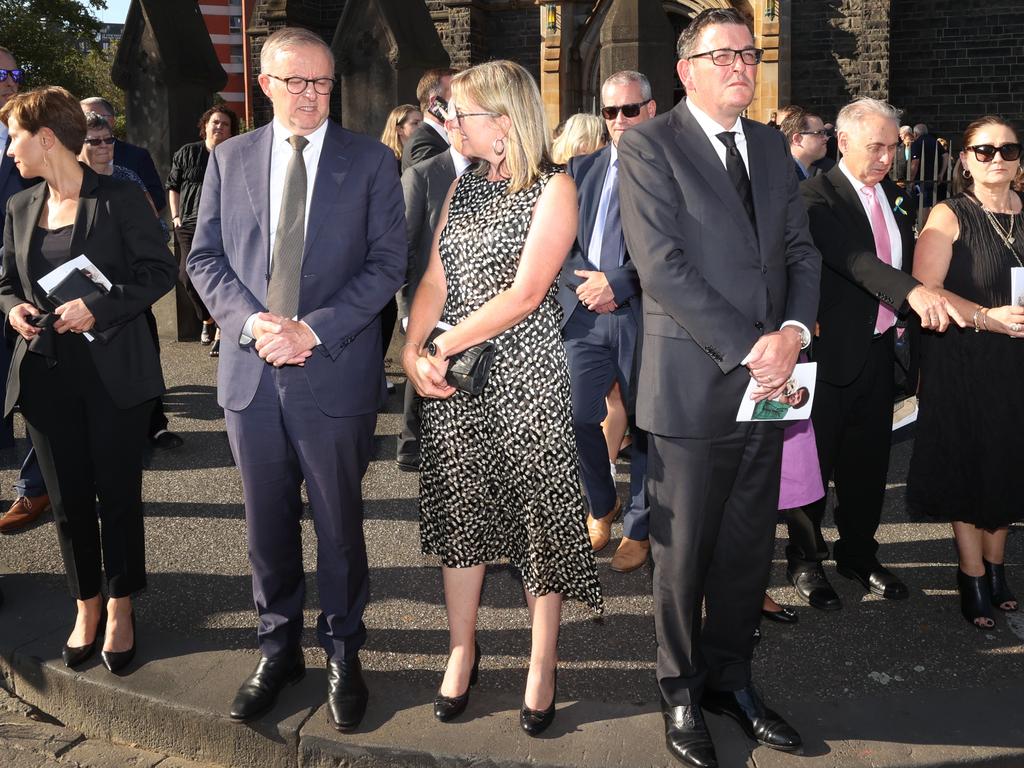There are many questions, and Kimberley Kitching deserves answers


The funeral at St Patrick’s Cathedral in Melbourne on Monday was a heartfelt and poignant tribute to Kitching, who died on March 10 of a suspected heart attack.
The eulogies, including those by Bill Shorten, father William Kitching and husband Andrew Landeryou, recalled a remarkable woman whose life was cut short at age 52.
For many of those who knew and worked with Kitching and earned her confidence, the tragedy of her death has been compounded by the way Labor has failed to recognise the pressure she felt with her Senate preselection not guaranteed and the way she had been treated by her Senate colleagues.
It has been sickening to watch Labor figures deny that Kitching was bullied or frozen out. In truth, Kitching was treated terribly.
Her husband, Landeryou, referred yesterday to “a cantankerous cabal” inside and outside the party who made her life unpleasant, and her friends and staff being “angry” about how she was treated. “She deserved so very much better,” he told mourners.

Penny Wong and Kristina Keneally have repudiated multiple media reports, including my column last Tuesday (“Kitching didn’t deserve to be treated so poorly”, 15/3), that chronicled the systematic isolation and exclusion of Kitching in the Senate.
Are Wong and Keneally implying that these articles have been made up?
Wong told Chris Uhlmann on Nine’s Weekend Today on Sunday that Kitching was not bullied or isolated by her Senate colleagues and, moreover, those saying she was lacked “common decency”.
Keneally, interviewed by Kieran Gilbert on Sky News’ Afternoon Agenda last Tuesday, said that my “assertions” were “not true”.
The journalists who have raised how Kitching felt based on conversations they had with her or with others span the media spectrum and include Andrew Probyn (ABC), Rob Harris (The Sydney Morning Herald/The Age), Samantha Maiden (news.com.au) and Sharri Markson (The Australian/Sky News).


Last Friday Wong, Keneally and Katy Gallagher issued an extraordinary statement saying “the allegations of bullying are untrue” and “other assertions” are also “similarly inaccurate”. The statement says their priority has been concern for Kitching’s family and loved ones, and they have not responded “out of respect for them”.
The problem with this statement, apart from being so coldly calculating, is that Kitching’s closest friends and her parliamentary and party colleagues have been raising how she felt and the stress she was under.
They are in no doubt – absolutely no doubt – that this pressure worsened any underlying health issues she had.
Kitching told me herself about how she was being treated by Labor’s Senate leadership team, as she did other journalists. We know it to be true because we heard it from her.
There has been no pushback from Kitching’s friends, family or colleagues about this reporting.
It only adds to their grief to hear it said that it is not true or now is not the time to mention these matters.

Shorten acknowledged that Kitching was under pressure at the time of her death. He was well aware of the discussions over her preselection.
“I have no doubt that the stress of politics in the machinations in the back rooms had its toll,” he said. “Stress is like invisible coats of paint. It’s got to be having an impact. And she was greatly stressed.”
The day before she died, senior Victorian Labor Right faction leaders held a Zoom meeting to discuss the Senate preselection. All lower house preselections in Victoria have been finalised.
That meeting did not endorse Kitching’s preselection and said the matter would be referred to the national executive, where the Left faction holds a majority.
The Plumbers Union’s Earl Setches was at the meeting. He has spoken about the impact of that meeting on Kitching’s state of mind.
“You’ve lost your job, publicly humiliated going through that whole process,” he said. “Of course, there were other health issues, but Christ it would have been enormous stress and strain on her.”
The most devastating attack on Kitching’s Labor colleagues has come from her friend, Health Workers Union secretary Diana Asmar, in an article for the Herald Sun on Saturday.
Asmar, who was also on that Zoom meeting and well aware of how Kitching was treated by her Senate colleagues, wrote that she was certain “the workplace bullying” had “significantly worsened her health”.
Wong has acknowledged personally denigrating Kitching in front of colleagues when she said during an internal debate on climate change in 2019: “Well, if you had children, you might understand why there is a climate emergency.”
Wong disputes the words but not the substance of what she said. And she did not apologise until it was made public.
Deputy Labor leader Richard Marles, like Wong and Keneally, said it had not been the right time to discuss these matters so soon after Kitching’s death.

But they have declined to say, repeatedly, when the right time is. Is now the right time, given her funeral was held on Monday?
Marles has his own questions to answer, which he has so far ducked and weaved.
Marles is a leading figure in the Victorian Labor Right faction. Kitching reportedly raised how she was treated with Marles at a meeting last year.
How did he respond? Labor leader Anthony Albanese says he was not aware of Kitching feeling bullied and isolated.
The only way forward for Labor is to announce an independent inquiry into how Kitching was treated by her party colleagues.
This will allow her family, friends, staff and colleagues to come forward and report what they know.
Asmar said she was writing to Labor’s national executive about how Kitching was treated by “Labor’s leadership group”.
But this is a leadership test for Albanese. Labor has rightly lashed the Coalition for how it has handled issues of sexual harassment and assault, and bullying, in its ranks.
For Labor to not act decisively when it concerns one of its own is hypocritical. Albanese should initiate an inquiry. Kitching is owed nothing less.





Now that Kimberley Kitching has been laid to rest, the Labor Party owes it to her memory, and to her family, friends and colleagues, to be truthful about the bullying she endured from the party’s Senate leadership team and the factional game-playing that caused her enormous stress at the time of her death.